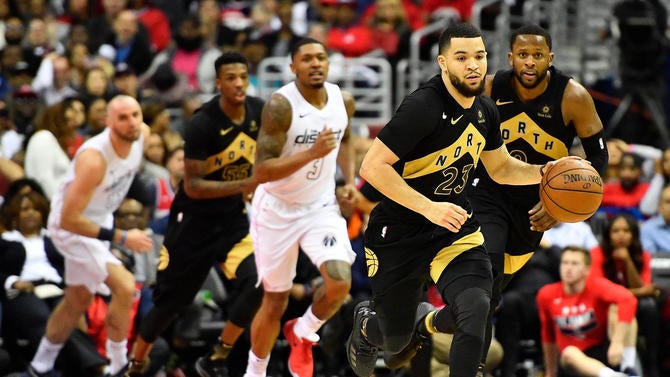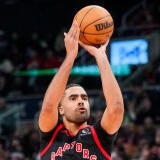NBA Playoffs 2018: Raptors show why they must trust the NBA's best bench, even vs. LeBron
Toronto won Game 6 -- and the series -- largely because of its deep bench
DeMar DeRozan and Kyle Lowry won't have to hear about their playoff struggles for a while. With a 102-92 victory in Game 6 of their first-round series against the Washington Wizards on Friday, the Toronto Raptors advanced to the second round of the playoffs and changed the conversation about their All-Star guards.
Neither one had a flawless two-week run, but Lowry completely controlled the clinching game down the stretch, finishing with 24 points on 9-for-15 shooting, six rebounds and six assists. DeRozan, meanwhile, did the most damage in Toronto's Game 5 win on Wednesday, with 32 points, five assists and two rebounds while shooting 12-for-24 and 3-for-4 from deep. (For my money, that performance even more impressive than his 37-point outburst in Game 2, given how he responded to the way Washington was defending him.)
DeRozan and Lowry deserve credit for leading their team and proving that they can be just as productive as they are in the regular season come playoff time. But that in itself is not why the Raptors are going to the second round.
Unlike previous playoff appearances, this time Toronto could not be thrown off its game by a trapping defense designed to take the ball out of Lowry and DeRozan's hands. It had spent all season running a movement-oriented system that naturally counters this. Over the course of the series, the Wizards realized their best strategy was essentially doing the opposite of what used to work: switching pick-and-rolls and trying to lure Toronto's guards into being simply scorers, not passers.
Washington acknowledged that, playing against these Raptors, the danger is not that Lowry and DeRozan might catch fire. It is that the ball might zip around the floor, with a seemingly endless array of players ready to punish you if you make a mistake.
In Game 6, Toronto started the fourth quarter with a five-reserve lineup: Fred VanVleet, Delon Wright, C.J. Miles, Pascal Siakam and Jakob Poeltl. In less than six minutes of work, that group turned a five-point deficit into a five-point lead. Lowry, center Jonas Valanciunas and, eventually, DeRozan, would check in to finish things off, rested and feeding off the energy created by the second unit. The Raptors won the fourth quarter 29-14.

Toronto had the best bench in the NBA this year, and it wasn't particularly close. The aforementioned five-man lineup outscored opponents by an absurd 17.1 points per 100 possessions in the regular season. A shoulder injury to VanVleet, though, meant that it was essentially unavailable to the Raptors against Washington until Friday.
VanVleet's tough on-ball defense, combined with his steady hand on offense, has changed many games, none more important than this one. But even highlighting his return as the difference-maker would be doing everybody else a disservice. What sets Toronto's reserves apart from other teams' is that the pieces fit together so well.
Two similar sequences in the fourth quarter illustrated how the Raptors can break games open and demoralize opponents. First, watch how Siakam -- a ridiculously athletic and versatile forward who might be a jump shot away from stardom -- moves his feet to stay in front of John Wall, leading to a Wizards turnover and a 3-pointer from Miles:
Then, watch how Lowry hustles to come up with a crucial steal and shovels the ball to VanVleet. This ignited a fast break that ended with Siakam scoring over Wall and screaming on the ground in celebration, just like the raucous crowd of lunatics at "Jurassic Park" outside the Air Canada Centre.
Before the playoffs started, Toronto coach Dwane Casey fielded a zillion questions about how he would handle his rotation. Time and time again, he said there was no rulebook that said he couldn't keep using his deep bench. Against Washington, Casey stuck to his guns, even giving Lucas Nogueira and Lorenzo Brown some meaningful playoff run. Late in games, and particularly later on in the series, you could see the advantage: The Wizards were tired.
This was evident in Washington's decision-making with its season on the line. This was evident in all eight of Raptors' offensive rebounds in the fourth quarter. And this was in no way an isolated incident -- Toronto had the best fourth-quarter defense and net rating in the league in the regular season. Depth might matter less in the playoffs, but it always matters, both in terms of lineup flexibility and being able to win a war of attrition. (It should be noted that the Wizards had an additional obstacle in their way: forward Otto Porter missed Game 6 because of a leg injury.)
If the Raptors' victory teaches us anything, it is that no series is defined by an individual matchup or even a battle of the backcourts. If you are to declare DeRozan and Lowry triumphant in their clash with Wall and Bradley Beal, it is in part a reflection of the talent around them. The inconsistency of Toronto's guards in years past is largely because they needed a system and supporting cast to take some pressure off of them. Could you imagine how much better Wall and Beal would look with a bench as loaded and cohesive as the Raptors'?
Toronto's next challenge will come against either the Indiana Pacers or the organization that has outclassed them in two consecutive postseasons: the Cleveland Cavaliers. If it turns out to be the Cavs, the rematch will bring lots of talk about the past and whether or not the Raptors can handle LeBron James. As many problems as a superstar like James creates, though, Toronto will have to rely on the strength of its overall ecosystem, where its two stars are buoyed by a long list of players they trust and rely on. In this respect, Cleveland would represent an even bigger contrast than Washington.






















